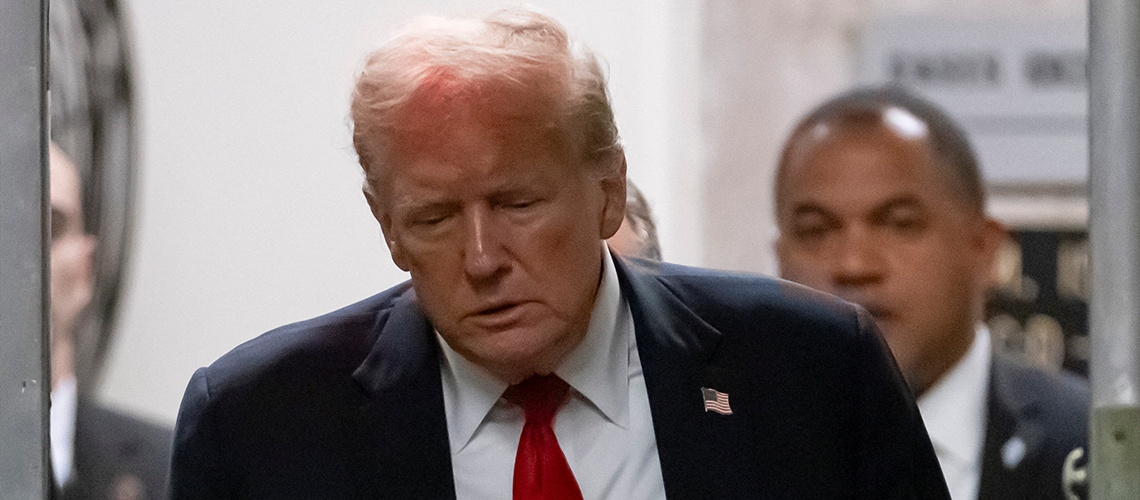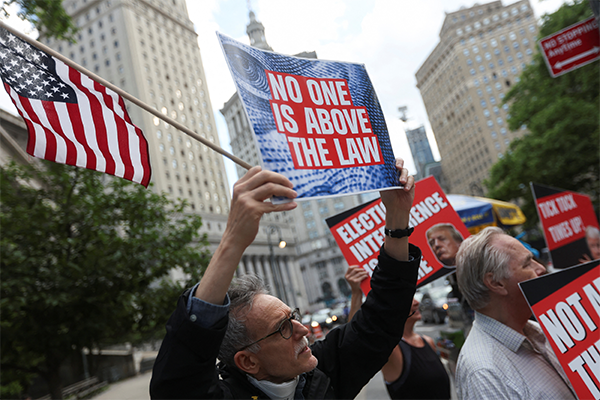The People versus Donald Trump
William Roberts, IBA US Correspondent Thursday 30 May 2024

Republican presidential candidate, former US President Donald Trump awaits the start of proceedings in his criminal trial at the New York State Supreme Court in New York, Thursday, 2, May, 2024. Doug Mills/Pool via REUTERS
Donald Trump has been convicted on 34 charges of falsifying business records to cover hush money payments. Global Insight delves into the first-ever criminal trial of a former US president.
Former US President Donald Trump has been found guilty of 34 felony charges of falsifying business records to cover hush money payments to adult film star Stormy Daniels during the 2016 presidential campaign. The verdict is the first time in US history that a former president has been convicted of a crime.
Over the course of the 22-day trial, a team of prosecutors under Manhattan District Attorney (DA) Alvin Bragg produced compelling evidence to show that Trump authorised a $130,000 payment to Daniels using his New York real estate business to disguise a campaign expense as ‘legal services’, violating state election and tax laws.
Trump had pleaded not guilty and is expected to appeal. Sentencing was scheduled for 11 July, just days before the start of the Republican National Convention where Trump will be formally nominated as the party’s 2024 presidential candidate. He potentially now faces jail time, although the judge has latitude to issue a suspended sentence.
The public trial, in a state court in front of a jury of Trump’s peers – 12 New Yorkers – saw Trump forced to sit still while tawdry elements of his personal life were aired. During the extraordinary proceedings, the former president was ordered not to intimidate witnesses or jurors with social media commentary. He was repeatedly held in contempt and fined by Justice Juan Merchan for violating a gag order, which Trump complained violated his free speech rights.
Bombshell testimony from Cohen, Pecker and Hope Hicks, Trump’s campaign communications director, showed Trump knew about the ‘hush money’ payments
At trial, the jury found that Trump’s former lawyer Michael Cohen and National Enquirer tabloid publisher David Pecker orchestrated a ‘catch and kill’ scheme at Trump’s direction, which was designed to keep Daniels from speaking publicly during the 2016 presidential campaign about their affair. Bombshell testimony from Cohen, Pecker and Hope Hicks, Trump’s campaign communications director, showed Trump knew about the ‘hush money’ payments. Prosecutors meticulously layered documentary evidence into the trial record supporting Cohen and the other witnesses. A handwritten note by Allen Weisselberg, the Trump Organization’s former chief financial officer, as well as bank statements, emails, text messages and phone and accounting records, backed up their stories.
Trump’s defence team, led by former US prosecutor Todd Blanche, had argued it wasn’t illegal to reach a private non-disclosure agreement with Daniels. In any case, they claimed, she was lying about her sexual encounters with Trump and had sought to extort money from him. After Daniels’ testimony, Trump’s team moved unsuccessfully for a mistrial on the grounds that her description of a tryst with the former president would unfairly bias the jury.
The conviction is certain to have an impact on Trump’s bid to regain the White House in the national election on 5 November. It will motivate Trump’s base of Republican voters who have bought into the narrative that he’s a victim of partisan legal attacks. Polls conducted before the trial showed that a conviction in the case would reduce the prospect of independent voters voting for Trump. Karl Rove, a senior Republican political strategist, has said that the polls show Trump’s guilty verdict will be a problem in key swing states such as Michigan, Pennsylvania and Wisconsin that he would need to win the presidency.
Taking the stand
At trial, Daniels, whose real name is Stephanie Clifford, described how she had met Trump at a celebrity golf tournament at a Lake Tahoe resort in 2006 and later recounted details of their sexual encounter at that meeting. After that first meeting, she said that Trump called her frequently and invited her to events.
The prosecution’s pivotal witness was Cohen, who had joined Trump’s real estate company as a lawyer in 2006 and was a close aide in the decade prior to Trump’s presidential run. Known in New York circles as a legal attack dog and fixer, Cohen turned on Trump in 2018 after the US Federal Bureau of Investigation raided Cohen’s home and offices in connection with the Department of Justice’s special investigation into Russian interference in the 2016 election. Cohen cooperated with federal authorities and pleaded guilty to federal campaign finance violations for the hush money scheme in which Trump was an alleged co-conspirator. While Trump was in the White House, Cohen served a year in federal prison.
In four days on the witness stand, Cohen testified calmly and evenly, responding respectfully to both the prosecutor and Trump’s defence lawyer who disparaged him as a liar and a thief. Cohen freely admitted he had lied in the past, having previously denied that Trump and Daniels had an affair and also having been convicted of perjury for lying to Congress. He admitted overcharging Trump $30,000 in connection with an online push poll for Trump’s campaign.

Celebrations outside Manhattan criminal court after the verdict in Donald Trump's trial for falsifying business records, New York City, 30 May, 2024. REUTERS/Mike Segar
In 2015, when Trump was planning to announce his candidacy for president, he was worried about stories coming out about his personal life, Cohen testified. He and Trump met with Pecker in Trump’s office in New York and agreed Pecker would promote Trump and work with them both to stop negative stories from emerging.
Crucial context to Trump’s alleged crime was the ‘Access Hollywood’ controversy during the 2016 presidential campaign. A month before the election, a 2005 audio recording surfaced of Trump speaking off-camera with a television host about kissing women uninvited and grabbing them by their genitals. A ‘massive’ uproar ensued, recalled Hicks.
As Trump’s campaign scrambled to contain the fallout, Pecker said he learned that Daniels was trying to sell her story of a 2006 affair with Trump. At trial, Pecker – who was the prosecution’s first witness – said he then notified Cohen, who wanted American Media Inc (AMI), parent company of the Enquirer, to buy the story. But Pecker had been advised by lawyers that such payments would be an illegal corporate contribution to Trump’s campaign.
According to Pecker, AMI had already paid $150,000 to Playboy magazine model Karen McDougal to buy her silence about a months-long affair with Trump, which as Pecker and Cohen described for the jury, Trump had authorised. ‘When I got on the phone, Mr Trump said to me […] Karen is a nice girl’, Pecker recalled at trial under prosecution questioning. Trump asked Pecker: ‘What do you think I should do’? ‘I think you should buy the story and take it off the market’, Pecker said.
A key moment from the tenth day of the trial involved an audio recording of Cohen and Trump discussing payment to AMI to kill the McDougal story. Cohen is heard telling Trump that he needs ‘to open up a company for the transfer of all of that info regarding our friend David’, referring to Pecker and Weisselberg.
‘I spoke to Allen about it when it comes time for the financing, which will be […]’, Cohen said. ‘What financing?’ Trump interrupted. ‘We’ll have to pay’, Cohen said. ‘We’ll pay with cash’, Trump said. ‘No, no, no, no, no’, Cohen told him.
Cohen set up a shell company to reimburse AMI for its $150,000 payment to McDougal, which AMI disguised as an employment contract to evade campaign finance rules, which prohibit direct corporate contributions.
The campaign violation was essential to the state’s case because under New York law the business record falsification charges alone would only have been misdemeanors
Pecker and AMI had reached non-prosecution agreements with federal authorities and were granted immunity by New York prosecutors for Pecker’s testimony, which was key to both establishing the facts around the payments to Daniels and in making clear that Trump knew the payment was a prohibited corporate campaign contribution. The campaign violation was essential to the state’s case because under New York law the business record falsification charges alone would only have been misdemeanors. Used to conceal another crime, falsified records become felonies under New York law.
When Daniels threatened to go public in October 2016, Cohen set up another shell company, Essential Consultants, and took out a home equity loan to pay Daniels $130,000. The transaction came just days before the presidential election. Then in January 2017, after Trump had won the election, Cohen testified he went to Weisselberg for reimbursement.
Thus, when Daniels threatened to go public in October 2016, Cohen set up another shell company, Essential Consultants, and took out a home equity loan to pay Daniels $130,000. The transaction came just days before the presidential election. Then in January 2017, after Trump had won the election, Cohen testified he went to Weisselberg for reimbursement.
Weisselberg suggested Cohen take the money as income, rather than as reimbursement, and agreed to pay Cohen the sum of $420,000. This covered the $130,000 for Daniels, plus $50,000 for the online push poll for Trump, $60,000 for a bonus and $180,000 to cover taxes. Cohen would be paid back in regular monthly amounts of $35,000 accounted for on the Trump Organization’s books as ‘legal services’. DA Bragg alleged those payments violated New York state election and tax laws and the jury agreed.
Heading into November
Trump didn’t take the stand in his own defence. The judge had ruled prosecutors would have been able to question him about New York’s civil fraud charges against his company and writer E Jean Carroll’s sexual assault and defamation claims. Trump is appealing judgments relating to both matters.
In three hours of summation, Blanche hammered at Cohen’s credibility, telling the jury that Cohen had repeatedly lied on the stand, fabricated stories and committed perjury. But after reviewing Cohen and Pecker’s testimony and Justice Merchan’s instructions, the jury rejected Blanche’s claims.
Some observers will see the prosecution and conviction of a former president as proof that the rule of law still prevails. But Trump and his Republican allies are claiming the proceeding was unfair, even unconstitutional. And there are more serious charges pending against Trump that are being deferred until after November.
Near the end of the trial, a parade of supporters showed up at the courthouse in Manhattan to decry the proceedings. House of Representatives Speaker Mike Johnson called the Court ‘corrupt’. He told a media event outside the courthouse that ‘this ridiculous prosecution […] is not about justice’ but ‘all about politics’.
In a speech the day after his trial, Trump again claimed to be the victim of a ‘partisan witch hunt’ and argued the trial was unfair, the judge was conflicted and – without naming him – that Cohen acted on his own.
Three other criminal cases involving the former president are on hold while courts wrestle with pre-trial issues and motions. Trump faces election fraud and conspiracy charges in the state of Georgia and federal charges in Washington, DC, stemming from his attempt to overturn the 2020 presidential vote. He faces criminal charges in a US court in Florida for allegedly improperly keeping secret documents after he left the White House. He denies the charges in all cases. None of these matters are likely to go to trial before November’s election, when the rule of law will be on the ballot with the ultimate jury – the American people.
William Roberts is a US-based freelance journalist and can be contacted at wroberts3@me.com
